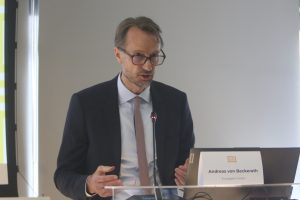Opposition parties and media unions condemn new strategy adopted by parliament, claiming the government wants to use it to exert more control over the media.
Albania’s parliament on Thursday evening adopted a national Strategy on Disinformation aiming for legal changes and safeguards in critical sectors such as elections, media and cybersecurity.
Opposition MPs, however, condemned it as an attempt to control the media and did not participate in the vote. Media unions are also critical.
The strategy, accompanied by an action plan, was drafted by the Special Anti-Disinformation Commission led by ruling Socialist Party MP Erjon Brace.
During the presentation of the strategy, Brace said there was “a need to increase national security after the cyberattacks that our country suffered in recent years and [arising] from the commitment to meet the standards of the European Union and other international partners in this regard”.
The four main objectives are to: build institutional capacities to prevent foreign interference in election campaigns; protect national security from such interference by strengthening partnerships with NATO, the EU and allies; protect the economy and other critical sectors from penetration by unfriendly foreign financing; and strengthen freedom of expression and of the media, supporting investigative journalism.
However, the commission’s work was boycotted by the opposition, which claimed that the strategy, despite its apparent commitment to combat disinformation, actually concealed the Socialist Party government’s real intention – to undermine media freedom and freedom of expression in general.
Isa Myzyraj, head of the Association of Journalists of Albania, said his union also did not support the plan.
“The Disinformation Strategy presented by the Socialist Party through a one-sided and non-inclusive commission is a bad moment for democracy and media freedom,” he said.
“Since the beginning, the ruling party created the commission in a controversial and unclear manner and without the participation of key actors, including political and civil society actors working in the field of media freedom,” Myzyraj told BIRN.
“One of the objectives of the strategy, for example, is to support investigative journalism. The ruling party has shown over the years that it is against free and independent journalism, has attacked it, intimidated it and done everything to ‘kill’ this journalism,” he added.
Source: BalkanInsight




